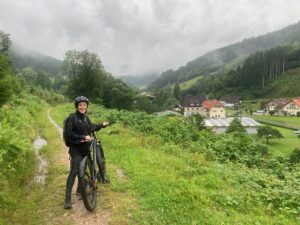Enter a “Risen Star”: Burcu F. Darst, PhD
Enter a “Risen Star”: Burcu F. Darst, PhD

Did you ever wish you could see your genetic future – what awaits you in your life’s road and what could you do to avert a potential danger to your long life if you could see the danger? To some extent, the answer may lie in systems biology.
Genes encoded in our DNA are the blueprints of life; this is called genomics. The messages encoded in our genes get transferred to the mirror-image RNA molecules that regulate their individual expression at different times during our life and in different parts of our body – called transcriptomics. Thus, DNA and RNA assemble the machinery that manufactures proteins that run the machine – called proteomics. Although all of our cells contain the same DNA, their protein content does not represent all possible proteins that the DNA can express. Selective gene expression throughout life and in response to external factors results in each cell expressing only a subset of the encoded proteins at any given time. Small-molecule byproducts of this manufacturing process are called metabolites that reflect what has been happening in our body under genetic and environmental influences – called metabolomics. The entire process is called systems biology, and the “holy grail” is to discover useful biomarkers for personalized healthcare. Thus, metabolomics and proteomics may not only identify novel biomarkers but also provide information on biology and highlight potential therapeutic targets.
Proteomics and metabolomics are less mature and more challenging approaches, but they offer greater insight into the full complexity of any given disease. Because proteins and metabolites are downstream of genetic and gene expression variations, they provide instantaneous snapshots of the state of a cell or person. They may change in response to environmental factors such as exercise or ingestion of foods or chemicals. Thus, a metabolomic or proteomic analysis of diseases might spotlight pathways for dietary or drug modulation.

Dr. Burcu F. Darst, a new assistant Professor of Public Health Sciences Division of the Fred Hutchinson Cancer Center in Seattle, is a name to remember. She is helping to unravel life’s mysteries through genomics and metabolomics.
Her research is focused on the thorny questions of the risks of prostate cancer and its aggressive forms in diverse populations. At her young age, she has accomplished much, earned international recognition, and received prestigious awards for her work – Prostate Cancer Foundation Young Investigator Award, American Association of Cancer Research NextGen Star Award, and National Cancer Institute K99 award. She is currently leading an effort to improve understanding of the genomic and metabolic mechanisms contributing to prostate cancer risk in men from diverse populations and improving the usefulness of polygenic risk scores and rare genetic variants for the prediction of life-threating prostate cancer across patient populations.
As a young student, Dr. Darst exhibited an aptitude in mathematics. In her undergraduate work at the University of California, San Diego, she focused on cognitive science and neuroscience, which provided the foundation for her later successes. She worked her way through research from the bottom up, beginning with literature reviews, recruiting research participants, conducting the demanding research protocols, and observing her mentors expending endless time and energy writing grants. While not the most satisfying elements of the research she ultimately came to love, the discipline prepared her for the next steps.
After college, she worked as a research data specialist at Scripps Research Institute in San Diego and, again, was involved in all phases of the research process, but this time she had more opportunity to write up the data for publication and present the information at conferences. Convinced of the importance of research and the positive impact it can have, she undertook her PhD thesis in genetic epidemiology at the University of Wisconsin.
Dr. Darst was introduced to the prostate cancer field while doing a 3-year postdoctoral fellowship at the University of Southern California working with world-renowned mentors, Doctors David Conti and Christopher Haiman. During this productive period, she authored several of the most impactful studies published in prostate cancer genetics to date in the emerging field of “polygenic risk scores” (the measurement of multiple genetic variants that increase the risk for prostate cancer and its aggressive forms) in men of different ancestries.
Historically, polygenic risk scores had been based on data from European-ancestry individuals (i.e., only White men). “Our polygenic risk score is built on a diverse sample, and it performs really well in non-European ancestry men, particularly in those of African ancestry who are at higher risk for this disease. This is very promising” observed Dr. Darst.
Rigorous evaluation of the potential usefulness of polygenic risk scores in every-day medical practice is necessary before it can be implemented across the general population. Because it still has limited ability to accurately distinguish between aggressive and non-aggressive disease in individual patients, there remain concerns about its use leading to overdiagnosis of non-life-threatening prostate cancers. However, when used with other assessments such as PSA, MRI, or other screening measures, a more accurate and comprehensive risk assessment may be made. Dr. Darst remarks, “There is strong potential for genetic research to have meaningful impact on disease outcomes. For example, the study of rare genetic variances may improve treatment of cancer, the identification of men at risk of aggressive prostate cancer, and reduce prostate cancer health disparities.
Further, we and others have shown that using rare genetic variants in conjunction with polygenic risk scores leads to improved identification of men at risk of overall and aggressive cancer.”
 In her current position at the Fred Hutchinson Cancer Center, Dr. Darst enjoys the tremendous support of their burgeoning infrastructure and outstanding faculty (including several of Dr. Catalona’s collaborators on other projects – Heather Cheng, Ruth Etzioni, Daniel Lin, Peter Nelson, Janet Stanford, Yengye Zheng, and Lisa Newcomb). The Bezos family has committed $710 million over the next decade to accelerate Fred Hutchinson Cancer Center’s (now serving as the University of Washington Medicine’s cancer program) multifaceted approach to scientific discovery. Stuart and Molly Sloan made another transformational commitment ($78 million) within the past few months.
In her current position at the Fred Hutchinson Cancer Center, Dr. Darst enjoys the tremendous support of their burgeoning infrastructure and outstanding faculty (including several of Dr. Catalona’s collaborators on other projects – Heather Cheng, Ruth Etzioni, Daniel Lin, Peter Nelson, Janet Stanford, Yengye Zheng, and Lisa Newcomb). The Bezos family has committed $710 million over the next decade to accelerate Fred Hutchinson Cancer Center’s (now serving as the University of Washington Medicine’s cancer program) multifaceted approach to scientific discovery. Stuart and Molly Sloan made another transformational commitment ($78 million) within the past few months.
Dr. Darst is continuing her work studying prostate cancer and expanding her genomic studies into the emerging realm of metabolomics, i.e., the biological mechanisms that move an individual from having genetic risk to having prostate cancer. Dr. Darst hopes that future research can pinpoint those men at risk of aggressive prostate cancer and prevent them from ever developing metastatic disease. She is grateful to the men who participate in research studies and reflects that the findings and progress in prostate cancer would not be possible without them.
Dr. Catalona predicts that Dr. Darst will continue to make impactful contributions to the field over the course of her career. Her intelligence, drive, expertise, and ability to collaborate are critical weapons in the fight against prostate cancer.
Dr. Darst states, “Prostate cancer is a highly heritable disease; if men at greater risk for prostate cancer could be identified, there is good potential for disease prevention. Seeing the danger down the road allows for preventative measures. Prostate cancer also represents one of the greatest health disparities in the United States. If we can prevent it in populations where the risk is greatest, we can potentially reduce the health disparities of prostate cancer. Prostate cancer research is meaningful and can improve people’s lives.”





















